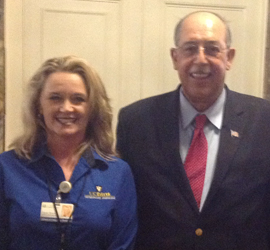Emergency Preparedness Planners Combine Forces for Heightened Food Safety & Security Awareness
Chris Brunner, March 19, 2015

Tracey Stevens, Deputy Director, Animals in Disasters Project, WIFSS, and retired Lt. General Russel Honoré, at the 2015 Wisconsin Governor’s Conference on Emergency Management & Homeland Security in Milwaukee
More than 500 people from fire, law enforcement, emergency management, and other first responder agencies attended the 48th Annual Wisconsin Governor’s Conference on Emergency Management & Homeland Security, held in Milwaukee, March 11 – 12, 2015. The conference is one of the oldest emergency management conferences in the United States. This year’s keynote speaker was retired Lt. General Russel Honoré, who led recovery efforts following the destruction of Hurricane Katrina in 2005.
Pre-conference training was held on Tuesday, March 10. Participants selected from three classes: Threat Assessment for the Active Shooter, Cybersecurity and, Agroterrorism. Included in the 30 students attending the one-day course, Understanding the Dangers of Agroterroism, were FEMA radiological and nuclear specialists, members of the United States Department of Defense Civil Support Team, Wisconsin Department of Agriculture, Trade and Consumer Protection inspectors, and other first responders.
Course instructors Dr. Michael Payne, Dairy Coordinator with the Western Institute for Food Safety and Security (WIFSS), and Ms. Tracey Stevens, Deputy Director, Animals in Disasters Project at WIFSS, highlighted the critical role first responders’ play in the preplanning process and creating an effective community response that will reduce or mitigate individual acts of terror.
Agroterrorism is a very real concern for the U.S. Department of Homeland Security who sponsors the Rural Domestic Preparedness Consortium (RDPC). WIFSS currently has six DHS certified courses, (AWR 151-156), offered through the RDPC. The courses aim to train first responders in rural areas of the country for disaster situations that involve or directly affect our food supply system.
Dr. Payne and Ms. Stevens implemented tabletop exercises to familiarize participants of potential roles and responsibilities and the importance of Unified Command structure in the event of a disaster. Scenarios included a Hoof and Mouth Disease outbreak, contaminated feed, a nuclear reactor meltdown, and an animal liberation terrorist incident.
At the end of the 8-hour course, class members had a complete overview of the various types of terrorist acts that could potentially come forth to threaten the food and agriculture industry. Most importantly they gained a broad perspective of the basics for food safety & security.
“We had no idea how vulnerable our industries are until participating in these courses,” commented a Wisconsin National Guard participant. “Community complacency is not in our best interest,” he emphasized.
The State of Wisconsin Emergency Management (WEM) has expressed interest in further training and exercise drills for 2015/2016. Payne and Stevens will next be in Harrisburg, PA, for a 3-day run of AWR 151, 153, 154 and 156, courses.
